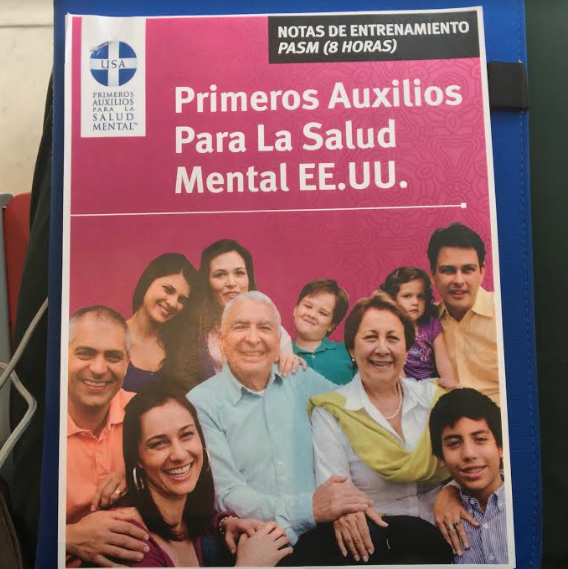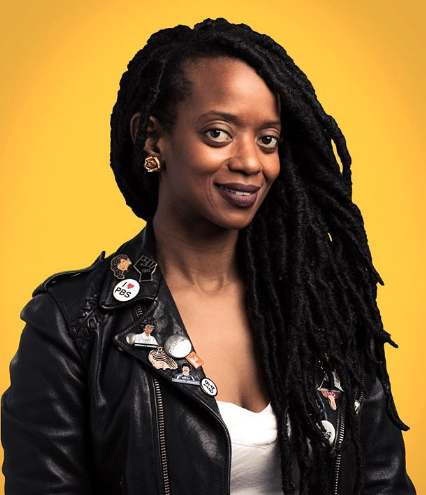HIPSTORY: Hakim Hill, Co-Executive Director & Cliff Notez, Founder and Owner (L to R)
1. What was the motivation behind starting HipStory Films?
HipStory Films is a subsidiary of HipStory; a digital media production company dedicated to centering marginalized identities in media through music, audio and video services, event curation, and of course film. HipStory Films began after shooting a short film for a poet, Shane Romero, in New York called Mouse Trap for his poem of the same title. From there, we decided to keep producing more films dedicated to social awareness. Our next films, The Art of Being Haunted and Vitiligo were both about Black men, but told through different lenses, with the former about inner-city violence and the use of therapy and the latter about a doctoral student having a mental breakdown due to racism. Having counseling and mentoring backgrounds, we decided that these films shouldn't only be seen in festivals and on Youtube, but we should also bring them into the school setting, hence The Art of Racial Trauma workshop. Since its conception, we have been to over 15 festivals, 10 schools, and have worked with the Museum of Fine Arts & Institute of Contemporary Art in Boston, HUB Week, MIT, Company One, and All Def Digital.
2. Up until Project Forgotten, your films focused on Black men and their trauma. What events led up to your shift to give attention to women of color?
The calamity of women of color going missing is not new. I'm sure most people would remember the short time when the news of women of color going missing in Washington D.C. went viral on social networks. That news came and went. Just before our first major public viewing in Boston of The Art of Being Haunted and Vitiligo, it occurred to me that our films, viewpoints, and even our Q&A panel, would be made up of Black men. We had literally forgotten about women of color. From there, the concept came: Well what does that look like on a major level? How do we personify this? Once we remembered, then the news of the women in Washington D.C. also came back and we remembered how the news quickly vanished. When we remembered the "forgotten," we were able to do something, which was writing the film. It is important to remember the problem so that you can find a solution.
For us, it's less about "giving" a voice to the voiceless than using our own male privilege to combat something that deserves more attention. You could break it down even more to notice that men of color are usually highlighted on the news when we speak of police brutality. On the sexuality side, someone probably couldn't name a single transgender person who has fallen to violence, which is also at a high rate. For us, it's about using our privilege to highlight these other injustices.
3. Even though the term "people of color" is inclusive of anyone non-white, there's an assumption that when a Black person uses it, it is only to reference Black people. How does HipStory Films clearly define this in Project Forgotten?
"Women of color" in Project Forgotten is defined as Black women. In this aspect, we thought it important to not undermine the experiences of Black women by being overly inclusive on that image. But the conversations would be open to other women who may have similar experiences as we also have a bit of intersectionality in there. Sexuality and language is also addressed in the film as very minor subplots.
4. Tell us more about The Art of Racial Trauma because we understand this to be a running theme throughout all HipStory's films.
We utilize our short films in the University setting to workshop students and administrators. There has been a strong intersection between social justice and mental health over the last year, so we've been using the films to curate discussion and help students/staff develop coping skills for trauma as it relates to racism. Aimed to be college specific, we collaborate with Counseling offices and other departments on campuses to help break barriers between the students and their resources. The workshop is broken into sections:
1. Context of Films (themes, trigger warnings, exposure of trauma, normalizing of reactions, key terms)
2. Film screenings
3. Debrief and Guided Discussion (group discussion, additional context, guided meditation and relaxation, resources, assessment gauged in learning)
5. Regardless of being part of a marginalized group, we're in an era where we must be cautious of how we present other marginalized groups. Project Forgotten is a film about women, but it's created by a team that usually focuses on men. How was this handled?
From the beginning, we wanted to be sure the film was authentic. In the writing, we were in constant conversation with the Black women in our lives. After we completed a few drafts, we found two producers in Los Angeles, both Black women, to give us critiques in order to complete the screenplay. We wanted to be sure their voices were present, so it took about a year just for the writing, and we ended up with over 15 drafts. It had to be this way; otherwise it would've just been two Black men trying to speak for Black women, which shouldn't be the case. It is a story we wanted to tell, but we needed to make sure it was honest, and their fingerprints were on it. As a sub-project, we have a photographer, who is a Black woman, taking portraits and videos of Black women asking them to tell us a time they've felt forgotten about. You can view the exhibit on our website.
6. Any projects that address the trauma between men and women, in the future?
The closest we have to that right now is our one-take experience film The Methodist, which explores the relationship of a method actor and his partner. As we like to think outside of the box when addressing these traumas, given that audiences take the medicine better in the entertainment, we would have to find a creative way to exclusively tell that kind of story. For instance, The Methodist is about over-working and code-switching, told through an actor not breaking character. For those who notice, the camera doesn't break from the actor in the film. It's not out of our pocket though, so there's a chance.
7. Where do you see HipStory Films in 5 years?
HipStory Films is going to keep outsourcing video services to artists locally and nationally. In the next year or so, I see us working on our first feature, one in which we've already begun applying for grants. That one specifically has a theme of homelessness, which is wildly abundant in Los Angeles. We are also developing a series with these social themes. In 5 years, we'll be touring more films such as the ones we already have and cover more of the United States in our workshops. At some point, they will be packaged in a similar fashion to the Miss Representation documentaries.
8. How can people support what you all are doing?
Right now, along with applying for grants through our Fiscal Sponsor, Filmmakers Collaborative, we are crowdfunding to help with our initial production in late April. This is the first time we've gone this route, as we'd like this to be our most polished film. Because the subject matter is so important to us, we want it to be more of a community affair because if people are invested in this, if they give to this, they will be more apt to consider what is actually going on in the country. Funds help go towards a diverse cast and crew, equipment, locations, insurance, food on set, editing, sound design, etc. If you'd like to support, all donations are tax-deductible and can be given here.
Also, if you work for a school or community program, you can visit our main website and inquire about bringing The Art of Racial Trauma to you and the youth you may work with.
To keep up with Kimo & Cliff as they expand HipStory Films, they can be found on Twitter, Instagram (Project Forgotten and The HipStory), Facebook, and on the web at Project Forgotten and Hipstory Films. To view the trailer for Project Forgotten and some of their short films, see the videos below.
































